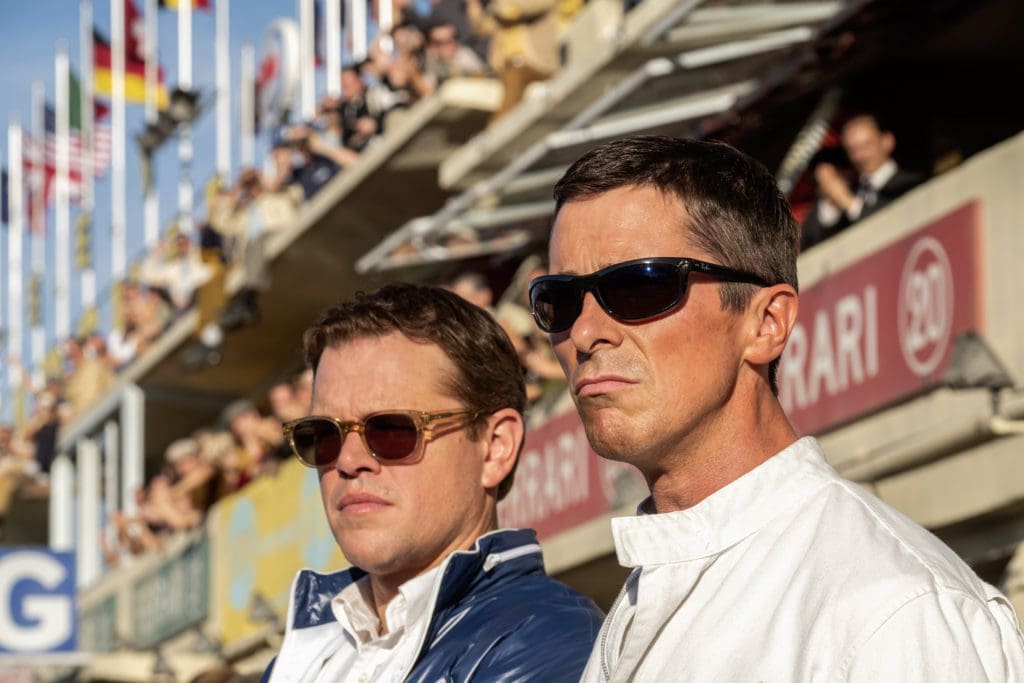
Written by Ben Murchison
Films based on real-events are often more captivating because the implausible way things unfold is superior to anything that could be dreamt up. The story of how Ford Motor Company developed the GT40 in 1966 to compete in the 24 Hours of Le Mans against the dominant Ferrari team fits squarely into that category, and it is told remarkably by Director James Mangold in Ford v Ferrari.
While things may have been dramatized to make for more entertaining moments, Lee Iacocca (Jon Bernthal) did propose the idea of buying Ferrari to Henry Ford II (Tracy Letts), and the spurning of their offer led the company to seek out racing legend, Carroll Shelby (Matt Damon), to aid them in building a race car that could challenge Ferrari. Shelby enlisted the help of English driver and friend Ken Miles (Christian Bale), and the rest is history. However, unless you are a car racing enthusiast, you likely know little about the car that they built or the outcome of the race—which actually enhances the drama of it all.
While the racing scenes captured by Mangold and frequent cinematographer collaborator Phedon Papamichael are unmatched, the chemistry between Shelby and Miles, and the relationship Miles has with his family, are the engine that make this film go. The decision to focus less on Ferrari and instead dive deeper into the passion and motivation that pushed both of the lead characters on the Ford team pays huge dividends. You find yourself far more invested in each turn and gear change that Miles makes because you have seen him at his most prideful and his most humbled moments You have seen him with his wife Mollie (Caitriona Balfe) and son Peter (Noah Jupe) and how they support him through it all. You witness Shelby’s trust in Miles being the right driver for this car, and the significant risk he’s willing to take to help get him to Le Mans.
As great as Ford v Ferrari‘s story is, and as intense as the action is on the track, it took great casting to ensure that the film works as well as it does. Balfe steals every scene she is in, as Mollie tries to balance her concern and love for her husband with her overwhelming sense that his purpose is to be behind the wheel. Jupe is clearly one of the most talented young actors working today, with an impressive resume in his short career, and Letts makes Ford II memorable, someone that you respect and admire despite his arrogance.
Bernthal is one of those actors that is exciting anytime you see him on screen, so, having him set the wheels in motion at the start of the film was great—although he was gravely underutilized as the film went on. Ray McKinnon excels as Phil Remington, an engineer with the Shelby race team, and Josh Lucas represents the perfect antagonist and challenge to Shelby and Miles, playing Director of Special Vehicles, Leo Beebe. Perhaps unjustly to the real Beebe, who was tasked with ensuring Ford won Le Mans in any way he thought best, the role is written without many redeeming qualities, and you genuinely enjoy watching him be undermined throughout.
Damon plays the more well-known Shelby with confidence and sincerity, and is clearly the straight man to bounce Bale’s portrayal of Miles off of. They don’t get as layered with Shelby, which may be a missed opportunity, but they give more of that depth to Miles. Bale is an exceptional actor, and has taken on some beloved and challenging characters throughout his career. You would think that he had been around cars his whole life with how effectively he conveys the nuances of working on and driving them, and how well he demonstrates the intensity and danger of racing at these speeds while still seeming giddy about it the entire time. He’s fun to watch because he also appears to be having fun in the role—even if it’s just because he doesn’t have to do an American accent.
There may be no better endorsement for this offering beyond saying that it feels much shorter than its 152-minute runtime. It is edited well, and offers multiple thrilling races that you are fully engaged in as well as the character building that gives them their higher stakes. If nothing else, the film should win awards for best sound, because you truly feel like you are sitting with Miles in that car. Ford v Ferrari may not run a perfect race, but it does achieve a perfect lap or two, and that is enough to place it amongst the year’s best and most enjoyable films.


Comments are closed.